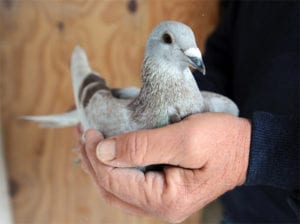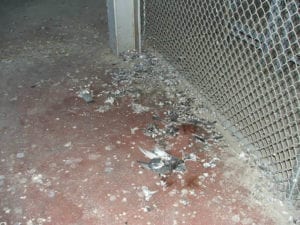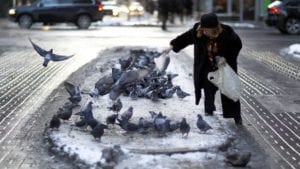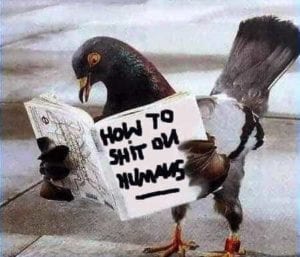
by Pigeon Patrol | Feb 5, 2020 | Animal Deterrent Products, Bird Spike, Pigeon Control, Pigeon Droppings, Pigeon Patrol's Services, Pigeon Spikes
A rare virus that can be contracted by humans has killed a large number of Victorian pigeons after being detected in Australia for the first time.

A type of avian paramyxovirus has resulted in the deaths of a number of hobby pigeon flocks.
Australian chief veterinary officer Dr Mark Schipp said the birds had died suddenly in large numbers.
The birds had sometimes appeared tired or shown neurological signs such as circling or head flicking before death.
He said human infection was extremely rare and usually occurred after contact with an infected bird.
“The rare virus causes only mild, short-term conjunctivitis or influenza-like symptoms [in humans],’’ Dr Schipp said.
“State veterinary authorities have been asked to review the health of their pigeon and poultry flocks.
“At this stage, there are no reports of this virus causing disease in wild birds, but we have asked the Australian Wildlife Health Network to be alert to this possibility.’’
Dr Schipp said the national Consultative Committee on Emergency Animal Disease had met twice to discuss the outbreak, which is being managed by Victorian chief veterinary officer Dr Hugh Millar and industry and veterinary authorities.
Dr Schipp said the consultative committee has agreed to investigating pigeon and other bird holdings where disease is suspected and to quarantine affected properties.
Anyone concerned about their pigeons or birds should contact an experienced poultry veterinarian, their local department of agriculture, or the Emergency Animal Disease Watch hotline on 1800 675 888.
Source
At Pigeon Patrol, we manufacture and offer a variety of bird deterrents, ranging from Ultra-flex Bird Spikes with UV protection, Bird Netting, 4-S Gel and the best Ultrasonic and audible sound devices on the market today.
Contact us at 1- 877– 4– NO-BIRD, (604) 585-9279 or visit our website at www.pigeonpatrol.ca
Bird Gone, Pigeon Gone, Seagull Gone, Pigeon issue, pigeon spikes, 1-877-4NO-BIRD, 4-S Gel, Bird Control, Pigeon Control, bird repellent, Bird Spikes, sonic bird repellent, stainless steel bird spikes, bird spikes Vancouver, Ultra Sonic Bird Control, Bird Netting, Plastic Bird Spikes, Canada bird spike deterrents, Pigeon Pests, B Gone Pigeon, Pigeon Patrol, pest controller, pest control operator, pest control technician, Pigeon Control Products, humane pigeon spikes, pigeon deterrents, pigeon traps, Pigeon repellents, Sound & Laser Deterrents, wildlife control, raccoon, skunk, squirrel deterrent, De-Fence Spikes, Dragons Den, Canada bird spikes, Canada pigeon, pigeon control, pigeon patrol, pigeon. Kill pigeons, crow, starling

by Pigeon Patrol | Feb 5, 2020 | Bird Netting, Bird Spikes, Pigeon Control, Pigeon Patrol's Services, Pigeons in the News, UltraSonic Bird Control
Pet Bird Transmitted Diseases. It may be hard to believe, but your pet bird can make you sick. There are several diseases that birds can transmit to people (these are called zoonotic diseases). For your own health, it is important to understand how to prevent transmission of these diseases.
Simple hygiene can prevent most of the diseases that birds and humans share. If you are conscientious about cleaning up after your bird and always wash your hands after handling your bird or his bowl and toys, it’s very unlikely that you will become ill. Of course, not every bird harbors such infections, but it’s always best to be safe.
Who’s at Risk

Pigeon in New York City (file / credit: STAN HONDA/AFP/Getty Images)
The risk of getting a disease from your bird is typically highest in people who already have chronic diseases, such as the very young, the elderly, HIV-infected individuals, organ-transplant recipients, and people receiving chemotherapy. People at risk should speak with both their physician and their veterinarian about the relative risks of disease transmitted from pet birds.
The following conditions are some of the more common infections carried by birds:
- Chlamydiosis – Also known as Psittacosis, can be transmitted to humans. In people, the disease causes flu-like symptoms of fever, chills and headache. If left untreated, Psittacosis can cause liver and kidney damage or even meningitis. Note: This Chlamydia is not the same infectious agent that spreads among humans as a sexually transmitted disease.
- Chlamydia infection transmits through feces and infectious particles in the air. Treatment for the infection includes an antibiotic, doxycycline, which doctors and veterinarians use in humans and birds. If you find yourself or other family members coming down with “the flu” and your bird isn’t feeling well, it could be Chlamydia; contact your family doctor and your veterinarian.
In your bird: Psittacosis causes varying severity of illness in birds. Some birds are simply carriers; this is typical in the cockatiel. Other birds may lose their appetite and become emaciated, depressed and may develop difficulty in breathing or diarrhea. Without treatment, most birds die from this disease. Diagnosis requires a panel of tests because no single test can accurately determine whether your bird is infected. You should obtain these tests as part of a pre-purchase examination, especially if there are clinical signs of Psittacosis.
- Avian Tuberculosis – Not often seen in birds, but transmission to people can lead to respiratory infections, swelling of lymph nodes below the jaw and even widespread disease in people with weakened immune systems. The disease can spread through the air or through the feces from infected birds.
In your bird:
Affected birds usually have vague symptoms, such as loss of weight despite a good appetite, dull feather coloring, increase in urine output, diarrhea and anemia. Diagnostic tests aren’t too reliable, but a veterinarian experienced with avian diseases will usually examine the feces for bacteria. Euthanasia of a bird infected with Mycobacteria is necessary due to the potential danger to humans.
- Histoplasmosis – A respiratory infection in people who inhale fungal spores from contaminated soil or dust. The Histoplasma fungus grows on bird feces, so it’s a concern in buildings where large amounts of pigeon droppings collect in roosting sites. While this isn’t a big issue in pet birds, it is prudent not to allow fecal matter to accumulate to the point that mold can grow on it.
- Cryptococcus – Another fungal infection. Though uncommon in pet birds, infection can cause diarrhea, paralysis, nervous-system signs and masses with a gelatinous consistency. Humans can contract this disease when they inhale the dust from dried droppings (most commonly from pigeons). Infection in people can be quite serious leading to meningitis, encephalitis (brain inflammation) or respiratory symptoms.
- Allergic Alveolitus – While not truly a zoonotic disease in the sense that it does not affect birds, bird owners can contract Allergic Alveolitus by inhaling particles of bird dander in the air. Allergic Alveolitus also goes by the names of Pigeon Lung Disease and Parakeet Dander Pneumoconiosis.
- Campylobacteriosis – A bacterial infection that causes gastrointestinal problems. It usually transmits through fecal contamination of food and water. While diarrhea, weight loss, and lethargy are common, Campylobacteriosis can also be present in birds that show no symptoms of illness.
Although this list is not inclusive, it does list the more common diseases that can pass to humans keeping pet birds. Good hygiene practices are the best method of prevention!
Source
At Pigeon Patrol, we manufacture and offer a variety of bird deterrents, ranging from Ultra-flex Bird Spikes with UV protection, Bird Netting, 4-S Gel and the best Ultrasonic and audible sound devices on the market today.
Contact us at 1- 877– 4– NO-BIRD, (604) 585-9279 or visit our website at www.pigeonpatrol.ca
Bird Gone, Pigeon Gone, Seagull Gone, Pigeon issue, pigeon spikes, 1-877-4NO-BIRD, 4-S Gel, Bird Control, Pigeon Control, bird repellent, Bird Spikes, sonic bird repellent, stainless steel bird spikes, bird spikes Vancouver, Ultra Sonic Bird Control, Bird Netting, Plastic Bird Spikes, Canada bird spike deterrents, Pigeon Pests, B Gone Pigeon, Pigeon Patrol, pest controller, pest control operator, pest control technician, Pigeon Control Products, humane pigeon spikes, pigeon deterrents, pigeon traps, Pigeon repellents, Sound & Laser Deterrents, wildlife control, raccoon, skunk, squirrel deterrent, De-Fence Spikes, Dragons Den, Canada bird spikes, Canada pigeon, pigeon control, pigeon patrol, pigeon. Kill pigeons, crow, starling

by Pigeon Patrol | Feb 5, 2020 | Bird Deterrent Products, Bird Netting, Bird Spikes, Pigeon Control, Pigeon Droppings, Pigeon Patrol's Services, Pigeon Spikes, Pigeons in the News, UltraSonic Bird Control
Woman battling crippling disease caused by pigeon feces
In the span of a few weeks, Erica Richards has been transformed from a vibrant 23-year-old woman who loved nature to a person battling for her life.
In early January, the Fredericton woman contracted a potentially fatal condition called cryptococcal meningitis, a fungal disease carried in pigeon feces.
The debilitating illness attacks the spine and brain, causing severe swelling. It left her confined to a hospital bed in a state of delirium for weeks.
But the most devastating side effect is that Ms. Richards is now blind.
“Be aware of this disease. It could kill a child in a heartbeat,” Ms. Richards said in an interview from her hospital bed.
“It could kill a senior in a heartbeat without you even having to worry about the symptoms. It comes on that fast. If you don’t realize the symptoms, it could kill you, too.”
Her emotional warning comes on the heels of city council’s approval earlier this month of a recommendation that it toughen its animal control bylaw to allow for fines for feeding pigeons. Once the amendment is drafted and declared law, it will give the city’s bylaw enforcement officers the power to ticket and fine offenders.
Ms. Richards said she decided to go public about her illness after learning about a recent newspaper story about a problem with pigeon poop in the city.
“Please don’t feed the pigeons,” she said. “Try to shoo them away if you see them. … It (the disease) is horrible. The pain that you get from this disease is crippling.
“The after-effects are with you for life and you just can’t stop thinking about it. I just want other people to know and try to stay away from pigeons and pigeon feces.”
Oddly enough, Ms. Richards said she has no recollection of ever being anywhere near pigeons.
“I am still wondering to this day where I got it,” she said. “I could have stepped in it and brought it into the home. I just don’t know.”
Ms. Richards said the symptoms started with a migraine headache that wouldn’t go away. She was admitted to hospital on Feb. 10 after many days of intense head pain. Shortly after, she went into a coma-like state.
“When I woke up I thought I had a mask over my eyes, but I was wrong. I was blind. I was recently told that I will be blind for the rest of my life. This is a tough thing for a 23-year-old to go through. … My world crumbled around me.”
Ms. Richards said the odds of surviving the disease are 50-50.
“However, I managed to make it through,” she said, battling tears. “I don’t know how but I am still here, and I am glad because I get to warn everyone else of this.”
Cristin Muecke, the Health Department’s regional medical officer, confirmed the disease is often associated with pigeon droppings. She said the illness can’t be spread person to person and is more common with someone who has immune problems.
Ms. Richards, however, said she has never had a problem with her immune system and that’s what’s so puzzling about contracting the affliction.
“I do not want anyone else to suffer this agonizing disease and I ask anyone who is feeding pigeons to stop,” she said. “It’s not just a matter of keeping your neighbourhood clean … it’s a matter of keeping people healthy.”
Source
At Pigeon Patrol, we manufacture and offer a variety of bird deterrents, ranging from Ultra-flex Bird Spikes with UV protection, Bird Netting, 4-S Gel and the best Ultrasonic and audible sound devices on the market today.
Contact us at 1- 877– 4– NO-BIRD, (604) 585-9279 or visit our website at www.pigeonpatrol.ca
Bird Gone, Pigeon Gone, Seagull Gone, Pigeon issue, pigeon spikes, 1-877-4NO-BIRD, 4-S Gel, Bird Control, Pigeon Control, bird repellent, Bird Spikes, sonic bird repellent, stainless steel bird spikes, bird spikes Vancouver, Ultra Sonic Bird Control, Bird Netting, Plastic Bird Spikes, Canada bird spike deterrents, Pigeon Pests, B Gone Pigeon, Pigeon Patrol, pest controller, pest control operator, pest control technician, Pigeon Control Products, humane pigeon spikes, pigeon deterrents, pigeon traps, Pigeon repellents, Sound & Laser Deterrents, wildlife control, raccoon, skunk, squirrel deterrent, De-Fence Spikes, Dragons Den, Canada bird spikes, Canada pigeon, pigeon control, pigeon patrol, pigeon. Kill pigeons, crow, starling

by Pigeon Patrol | Feb 5, 2020 | Animal Deterrent Products, Bird Netting, Bird Spike, Pigeon Droppings, Pigeon Spikes, Pigeons in the News, UltraSonic Bird Control
Sampling of pigeons captured on the streets of Madrid has revealed the bacterial pathogens they carry. Researchers writing in BioMed Central’s open access journal Acta Veterinaria Scandinavica found two bugs that were highly prevalent in the bird population, Chlamydophila psittaci and Campylobacter jejuni, both of which cause illness in humans carried by pigeons.
Fernando Esperón from the Animal Health Research Center, Madrid, Spain, worked with a team of researchers to analyse blood and enema samples taken from 118 pigeons caught using gun-propelled nets.
He said, “The present study demonstrates the extremely high prevalence of two zoonotic pathogens in feral pigeons in Madrid. At the same time, infection with these pathogens did not appear to be associated with any harmful clinical signs in the birds themselves. This leads to the hypothesis that pigeons act as asymptomatic reservoirs of Chlamydophila psittaci and Campylobacter jejuni. These birds may therefore pose a public health risk to the human population.”
Chlamydophila psittaci was found in 52.6% of the carried by pigeons captured, while Campylobacter jejuni was present in 69.1%. Although there have been few reports of disease transmission between pigeons and humans, it can occur by aerosols, direct contact or indirect contact through food and water contamination.
According to Esperón, “Thermophilic Campylobacter species are considered the primary pathogens responsible for acute diarrhea in the world. In fact, in many countries such as England and Wales, Canada, Australia and New Zealand Campylobacter jejuni infection causes more cases of acute diarrhea than infection by Salmonella species.”
Source
At Pigeon Patrol, we manufacture and offer a variety of bird deterrents, ranging from Ultra-flex Bird Spikes with UV protection, Bird Netting, 4-S Gel and the best Ultrasonic and audible sound devices on the market today.
Contact us at 1- 877– 4– NO-BIRD, (604) 585-9279 or visit our website at www.pigeonpatrol.ca
Bird Gone, Pigeon Gone, Seagull Gone, Pigeon issue, pigeon spikes, 1-877-4NO-BIRD, 4-S Gel, Bird Control, Pigeon Control, bird repellent, Bird Spikes, sonic bird repellent, stainless steel bird spikes, bird spikes Vancouver, Ultra Sonic Bird Control, Bird Netting, Plastic Bird Spikes, Canada bird spike deterrents, Pigeon Pests, B Gone Pigeon, Pigeon Patrol, pest controller, pest control operator, pest control technician, Pigeon Control Products, humane pigeon spikes, pigeon deterrents, pigeon traps, Pigeon repellents, Sound & Laser Deterrents, wildlife control, raccoon, skunk, squirrel deterrent, De-Fence Spikes, Dragons Den, Canada bird spikes, Canada pigeon, pigeon control, pigeon patrol, pigeon. Kill pigeons, crow, starling

by Pigeon Patrol | Jan 31, 2020 | 4-S Gel Bird repellent, Animal Deterrent Products, Bird Spike, Pigeon Control, Pigeon Droppings, Pigeon Patrol's Services, Pigeon Spikes, Pigeons in the News, UltraSonic Bird Control
 Now that the weather is getting warmer, I’d like to open my windows and get some fresh air in my apartment. The windows and building are filthy grimy and covered with pigeon poop problem on the outside. The ledge and the side of the building are too. If I open the window the soot all blows into our apartment and I don’t even want to know what diseases could come from the poop. Are landlords required to wash the facade of a building? What about windows? I can still see out of them, but just barely. And if a landlord is required to do this, how can I get mine to do it? Our landlord does the bare minimum to maintain our building.
Now that the weather is getting warmer, I’d like to open my windows and get some fresh air in my apartment. The windows and building are filthy grimy and covered with pigeon poop problem on the outside. The ledge and the side of the building are too. If I open the window the soot all blows into our apartment and I don’t even want to know what diseases could come from the poop. Are landlords required to wash the facade of a building? What about windows? I can still see out of them, but just barely. And if a landlord is required to do this, how can I get mine to do it? Our landlord does the bare minimum to maintain our building.
My friend, Emma, is two and a half years old. She’s a big girl now and doesn’t need a diaper. But three or four months ago she could fill a diaper as well as any 6’5″ sailor who ate all the beans in the galley. I’m talking arm pits to knees! Where does it all come from? It’s as if small children are packed with adult-sized digestive systems. Same with pigeons; they generate a remarkable volume of poop given their size. Maybe it’s because they will eat anything, including the bodies of their fallen comrades.
Everyone who lives in a city has a pigeon story. I used to drive an MG convertible. I remember waiting at a stop light on Division Street. I happened to look up and from the steel girder above I noticed a pigeon’s ass maneuvering to drop a bomb. I couldn’t go anywhere! I ended up with what seemed to be a bucket load of shit running down the back of my shirt. Needless to say, I don’t believe any of wives’ tales about pigeon poop bringing good luck.
In fact pigeon poop is dangerous. There are several diseases associated with p-scat. Pigeons are the subjects of eradication programs throughout the world’s large cities.
In San Francisco, we have laws prohibiting the feeding of pigeons. The San Francisco Department of Public Health has a program devoted to dealing with pigeons and their excrement. If you have already complained to the landlord about the problem in writing and he has done nothing, call them.
I am not aware of any specific legal requirement for landlords to wash windows or facades of their buildings. But I’m willing to bet that there are other issues with the building and your apartment, given the lack of maintenance. Take a look around and check to see if there is peeling paint; windows that won’t open (sealed shut with shit?); cracks in the walls; leaks; other safety hazards, etc. If you believe there are violations, inform the landlord in writing. Again, if he doesn’t respond, call a Housing Inspector with the Department of Building Inspection, make a complaint and arrange for an inspection for this pigeon poop problem.
If the landlord tells you there is nothing he can do, maybe he needs a diaper.
Post From: Tenant Lawyers
At Pigeon Patrol, we manufacture and offer a variety of bird deterrents, ranging from Ultra-flex Bird Spikes with UV protection, Bird Netting, 4-S Gel and the best Ultrasonic and audible sound devices on the market today.
Contact us at 1- 877– 4– NO-BIRD, (604) 585-9279 or visit our website at www.pigeonpatrol.ca
Bird Gone, Pigeon Gone, Seagull Gone, Pigeon issue, pigeon spikes, 1-877-4NO-BIRD, 4-S Gel, Bird Control, Pigeon Control, bird repellent, Bird Spikes, sonic bird repellent, stainless steel bird spikes, bird spikes Vancouver, Ultra Sonic Bird Control, Bird Netting, Plastic Bird Spikes, Canada bird spike deterrents, Pigeon Pests, B Gone Pigeon, Pigeon Patrol, pest controller, pest control operator, pest control technician, Pigeon Control Products, humane pigeon spikes, pigeon deterrents, pigeon traps, Pigeon repellents, Sound & Laser Deterrents, wildlife control, raccoon, skunk, squirrel deterrent, De-Fence Spikes, Dragons Den, Canada bird spikes, Canada pigeon, pigeon control, pigeon patrol, pigeon. Kill pigeons, crow, starling






